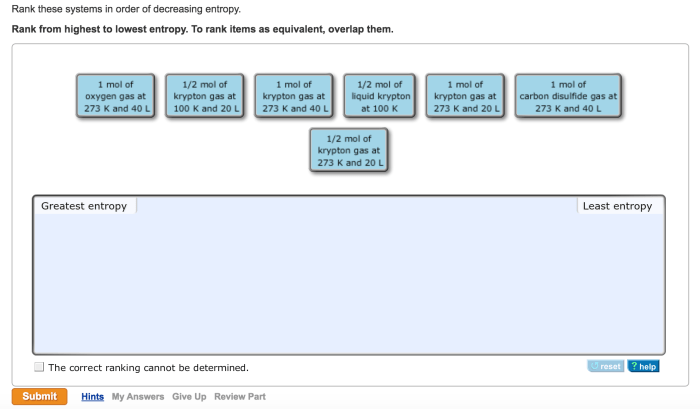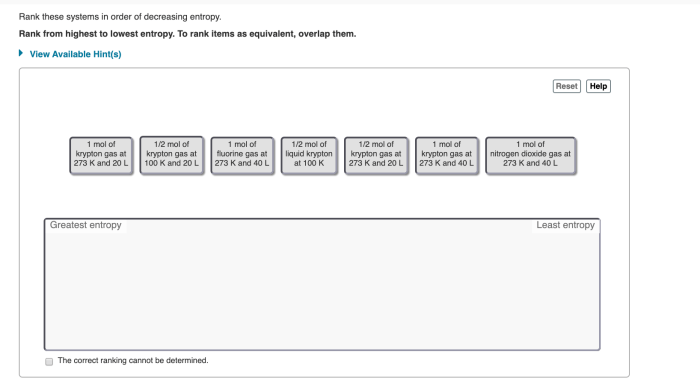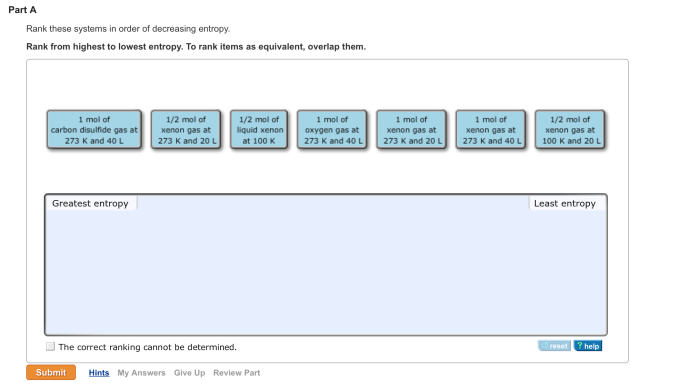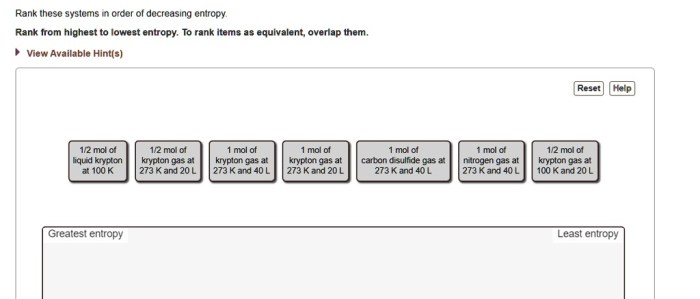Rank these systems in order of decreasing entropy. This concept plays a crucial role in ranking systems, as it measures the level of disorder or uncertainty within a system. As entropy decreases, the system becomes more ordered and predictable.
Understanding the factors that influence entropy and the methods used to rank systems based on entropy is essential for designing effective ranking algorithms. This guide will delve into the intricacies of entropy-based ranking, exploring its applications and providing real-world examples to illustrate its significance.
Ranking Systems and Entropy

Entropy, a measure of disorder or uncertainty, plays a crucial role in ranking systems. It quantifies the randomness and unpredictability within a system. In ranking systems, entropy is used to order systems based on their level of organization, with lower entropy indicating higher organization and predictability.
The concept of decreasing entropy implies that systems are ranked in order of increasing organization and predictability. This means that systems with higher entropy are more disordered and less predictable, while systems with lower entropy are more structured and predictable.
Methods for Ranking Systems
- Entropy-based ranking:Uses entropy as the primary metric for ranking systems. Systems with lower entropy are ranked higher.
- Information-theoretic ranking:Considers the information content of a system to determine its ranking. Systems with higher information content are ranked higher.
- Statistical ranking:Uses statistical methods, such as hypothesis testing and regression analysis, to rank systems based on their performance or characteristics.
Factors Influencing Entropy
- Number of states:Systems with a larger number of possible states have higher entropy.
- Probability distribution:The distribution of probabilities across states affects entropy. More uniform distributions result in higher entropy.
- Correlations between states:Correlations between states can reduce entropy by making the system more predictable.
Applications of Entropy in Ranking, Rank these systems in order of decreasing entropy.
- Ranking search results:Entropy can be used to rank search results based on their relevance and diversity.
- Recommender systems:Entropy can be used to personalize recommendations by identifying users with similar preferences.
- Machine learning models:Entropy can be used as a metric to evaluate the performance of machine learning models and select the best model.
Case Studies and Examples
- Example 1: Ranking web pagesWeb pages can be ranked based on their entropy, with lower entropy indicating higher relevance to a specific query.
- Example 2: Ranking user profilesUser profiles can be ranked based on their entropy, with lower entropy indicating a more consistent and predictable user behavior.
User Queries: Rank These Systems In Order Of Decreasing Entropy.
What is entropy in the context of ranking systems?
Entropy is a measure of disorder or uncertainty within a system. In ranking systems, it quantifies the randomness or unpredictability of the rankings.
How can entropy be used to rank systems?
Entropy-based ranking methods assign higher ranks to systems with lower entropy, indicating a higher degree of order and predictability.
What factors influence the entropy of a system?
Factors such as the number of states, probability distribution, and correlations between states can affect the entropy of a system.


